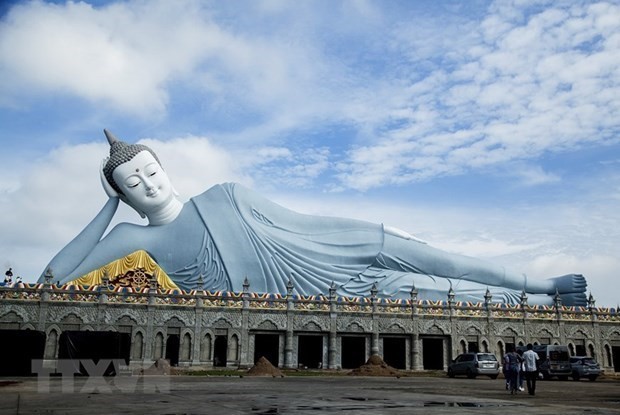
Giant Buddha statue in Soc Trang attract tourists
Latest
 |
| Som Rong Pagoda is home to a giant outdoor statue of the Buddha lying in position as it has attained Nirvana. (Photo: VNA) |
Going for a stroll in Soc Trang city, visitors view ancient Khmer pagodas like Kh’leang, Mahatup, and Tra Tim. Among them, Botum Vong Sa Som Rong (Som Rong Pagoda) is a unique Buddhist temple in terms of both history and architecture.
Local monks said Som Rong was built in 1785 and has undergone several restoration and expansion projects over the years. It is named after a wild plant that grows a lot around the pagoda.
Featuring a traditional architectural style like other Khmer pagodas in the southern region, Som Rong, covering 5 hectares of land, includes a main hall, a house for monks, and a library with over 1,500 books serving local students, residents, and followers.
Coming to the pagoda, visitors are welcomed by a gate with a covering of large overgrown “sao” trees. The gate is decorated with many traditional patterns such as Naga and Krud - divine creatures in the Khmer culture. On top of it are five towers which symbolise Mount Meru. This mountain is believed to be the place where the five Buddhas of the future reached enlightenment, and also where five gods of Brahmanism are seated.
The main hall, the place for worshipping the Buddha, is supported by six rows of columns and covered with three levels of roofs. Each roof level is decorated with traditional dragon patterns of Khmer people. Its column joints are adorned with sculptures of the Keynor goddess and the Krud divine creature, adding to the beauty and majesty of the structure.
The hall entrance is flanked by statues of the Reachsei lion, believed to be the guardian of the Buddha.
Inside the main hall, walls and the ceiling are covered with murals depicting the life of Lord Buddha. Among the Buddha statues on the altar, there are two wooden ones made when the pagoda was built. These two standing statues have their arms stretching and hands with red lines facing outward, aiming to remind people to avoid evil and to continue to do good deeds.
In particular, the Som Rong Pagoda is home to a giant outdoor statue of the Buddha lying in position as it has attained Nirvana. It is 63 metres long and 22.5 metres tall, and placed at about 28 metres above the ground. That’s why this temple is also called the “pagoda of lying Buddha”.
Another highlight of Som Rong is a tower that is 11 metres wide and 25 metres tall on an area of 100 square metres. Built in 2010 and finished in 2012, it has four fronts and four entrances representing “tu” (loving-kindness), “bi” (compassion), “hi” (empathetic joy), and “xa” (equanimity). The entrances also feature sophisticated Naga-themed details and decorative patterns of the Khmer culture.
Another unique feature of this tower is its colour. Instead of the traditional yellow, it is painted grey, giving it a majestic look. The tower has helped make Som Rong different from other Khmer pagodas in Soc Trang province.
Thanks to the harmonious combination of architectural features, the Som Rong Pagoda is a picturesque place of worshipping for local Buddhist followers. This characteristics also make the pagoda a magnet for visitors from far and wide to come to explore the special cultural and architectural values of the Khmer people in Soc Trang and the southern region as a whole.













